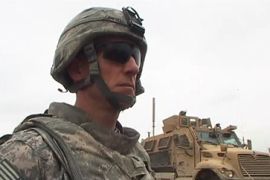
Colonel Campbell’s war
Following one US army colonel during the final days of his tour of duty in Afghanistan.
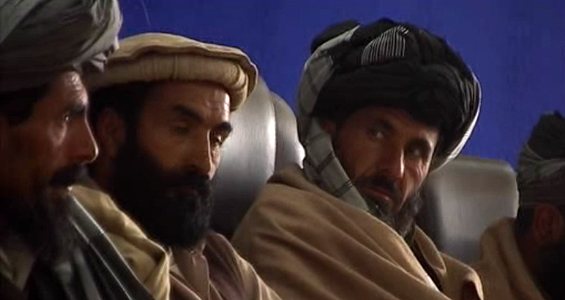 |
| Colonel Campbell adopts a meet-and-greet approach with local community leaders |
This week Barack Obama, the US president, will meet Hamid Karzai, the Afghan president, in Washington.
The meeting is seen as critical to the relationship between the two countries ahead of an expected summer offensive in the southern Afghan province of Kandahar, one of the key battlegrounds in Nato’s war against the Taliban.
However it comes after nine years of conflict and at a time when many are wondering what continual fighting will ever achieve.
Recently reporter David Brill followed Colonel Robert Campbell of the US army through the last days of a tour of duty in Afghanistan.
It has been a violent morning in Afghanistan’s Khost Province. I am in a military convoy travelling to see the damage. The soldiers are tense as we pass a vehicle that was blown up by a roadside bomb just a few hours before.
“What we drove past, just back there, was a vehicle-borne IED – suicide bomber. Everybody is okay and the driver was doing the right thing,” Colonel Campbell, the commander of the US squadron, explains.
When we get a little further down the road, Campbell tells me that General Azra from the Afghan army, the ANA, wants to take a look at the damage and that he will be coming along with us.
“Anywhere he goes, we go, because if he wants a combined action, we are right there with him,” he says.
This is a new partnership in Afghanistan – a counter-insurgency campaign where the locals work closely with US forces.
But the relationship is under strain. The general is not happy because another US Humvee has been destroyed, and no one told him.
The colonel will not say it publicly but he had not even been told that US special forces were on this operation, on his turf.
Building momentum
| PEOPLE & POWER |
|
|
| Watch other episodes of People & Power |
More programmes |
Colonel Campbell has been here for 12 months and his tour of duty is about to end.
His replacement, Stephen Lutsky, says the colonel has done a great job.
“I see we have got to capitalise on the success that Colonel Campbell has had and where his partnership and combined action with the ANA have gone. We do everything with the ANA,” Lutsky says.
“One thing I have seen with counter-insurgency is that once the population starts to accept and be part of the solution, it builds its own momentum.”
But I soon realise that “building momentum” is harder than it sounds.
With just days until he leaves the country, Campbell is about to embark on his farewell tour to say goodbye to the local Afghan leaders.
He says that he has mixed feelings about handing over and leaving the country.
“You pour your heart into something like this, you want to see it through, you want … you want victory,” he says.
The locals
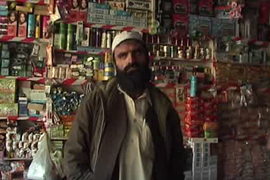 |
| Campbell says that connecting with the locals is key to the new ‘fight less, talk more’ approach |
I first met the colonel six months ago when I reported on the construction of a major road in Afghanistan. Now he is giving me almost total access to his operations.
We stop in the village of Gerda Serai to get some “atmosphere”, as the colonel puts it, and to “catch up with the locals”.
The bazaar seems peaceful enough but Campbell’s sergeant knows better.
“This town is not coalition-friendly. There are a lot of ambushes down through here. A lot of IEDs have been found through here,” he tells me.
We visit a shop owner and Campbell takes his helmet off as he talks to him about business.
“I’m just trying to connect with these guys a little better, that’s all,” he explains.
“I look like a robot unless I take this stuff off. Now I look like a human being.
“The Afghans don’t like the sunglasses. You know, there’s not a good level of trust there – when you’re wearing sunglasses they can’t see where your eyes are.”
Meet-and-greet
The colonel’s meet-and-greet strategy is a key part of the “fight less, talk more” new counter-insurgency campaign.
According to the Americans, it is about building, not destroying.
“You’re starting to see some small development improvements here, it’s a very slow stair step to putting a road through this bazaar. One is the retaining wall behind the bazaar here, which you’ve seen on the way through. The other one are these solar lights here, which you see right next to us. Those are small improvements that we’re making,” Campbell says.
But without the support of the local leaders, development on any scale is impossible. So the colonel is constantly on the move, involved in meeting after meeting.
One meeting involves Abdul Whali, the son of a powerful warlord. His father, Pacha Khan Zadran, has switched his allegiance many times. Now his son is the sub-governor of the district.
Campbell sets out a new and controversial strategy, costing billions of dollars and funded by the international community. The money will be used to pay the Taliban to lay down their weapons.
“The good Taliban. You know there are Taliban that are good Taliban, they don’t fight – they just believe in the Taliban ways of life but they’re not violent – and if we can bring them over to our side, tell them to put their weapons down, I think that would be a good thing,” Campbell says.
“You know I can kill 100 men up here next summer, 200 men, 300 men, but that’s not going to do us any good.”
But the sub-governor’s response is about stopping people siding with the Taliban, not convincing the Taliban to lay down their arms.
Campbell is polite, but the two men are talking at cross-purposes. Either his message is not getting through or it is being ignored.
Lost in translation
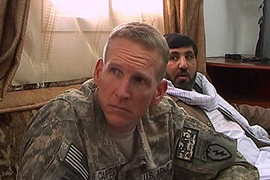 |
| During his many meetings with local leaders, there is sometimes more confusion than clarity |
Another part of the new strategy is to build and train the Afghan army and it seems that there is a lot of work to be done here also.
Again, Campbell does not say much, but the Afghan soldiers have not loaded their magazines properly. If shooting starts, they will be in big trouble.
And there are communication problems in most of the meetings I witness. Sometimes there seems to be more confusion than clarity and a lot gets lost in translation.
On another day we travel to General Azra’s headquarters. If talking not killing is the new plan for victory, then this gathering may be Campbell’s crowning achievement.
He has pulled together some of the region’s most powerful leaders for a ‘shura’, or meeting. Getting them all in one room is no mean feat. But nothing in this war-torn nation is ever easy or straightforward.
First, Campbell has to have a separate meeting with Pacha Khan Zadran. He is an infamous warlord, and now a member of parliament.
His message is clear: If the Americans think they can woo the Taliban, they are wasting their money.
“If they want the nation on their side, the $120mn they have needs to be spent on the nation. Not on the Taliban. They won’t come over. They’ll take the money and still stay on the other side. I have also spoken to Karzai,” he says.
Pacha Khan is a cunning operator and Campbell knows he has to keep him on side.
Preaching unity
The meeting has been called to discuss security issues, and Campbell is preaching unity.
“We will lose if we can’t come together like this in peace and share our concerns with each other. We will lose in the summer if the enemy comes back and lives on the mountain tops and comes to your villages for supplies,” he tells those gathered.
“I think we all have something in common – we want a better place for our children to grow up.”
But Pacha Khan presents a gloomier view.
“What has gone wrong now that the Americans, the national army and the police have summoned me here to tell me there’s a problem? To tell me it’s a Taliban base, it’s their centre and the people shelter them,” he says.
“The Taliban is there. They’re out on the roads organising suicide attacks, planting land mines and creating more problems. I’m asked to solve the problem because I’m your representative. Tell me now what action should be taken. Don’t come and complain later.”
The meeting continues, but nothing concrete is resolved.
As the leaders file out, it is impossible to read their faces, but the colonel is pumped.
“That was a good meeting. I’m motivated now. Very good meeting this morning – a couple of key things that came out of that – they’re talking about district cooperation and tribal unity – that’s huge in Afghanistan,” he says.
But there is not much unity going on outside – Pacha Khan is holding court, complaining that the Americans have arrested his barber. He asks the colonel to release the barber because he is innocent.
It is just another issue for Campbell’s successor to tackle.
Army discipline
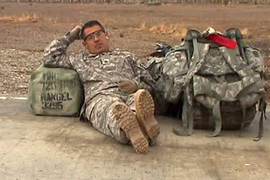 |
| Campbell and his squadron may be going home but the war drags on |
If and when the coalition forces leave Afghanistan, it is the Afghan National Army, who will take over.
I get an opportunity to watch them going through their paces. Despite army discipline, some are not taking the training seriously. But, it seems the Americans are prepared to ignore these shortcomings.
“As soldiers, they’ve developed a lot. They are doing really good,” one American soldier tells me.
“Way back in the day, it was a completely different ANA army, and right now they are becoming one with the public greatly. We can’t go anywhere without the ANA’s support. We’re all about the combined action and it’s developing quite well.”
While the war drags on, for Colonel Campbell’s squadron the war is over. He has lost five of his men, but hundreds are returning home safely, although not unaffected.
Asked whether Afghanistan will ever be a stable country, he says: “I think so, I do think so.”
“You have to understand something. We are never going to rid the Taliban completely. The Taliban is going to be here. It is like a bug, you can’t kill it, you can just control it and prevent it from overcoming a government and over-powering a security force.
“So there will be violence here. You are not going to stop violence completely, but your ability to control it and the ability of a government to deliver to its people that’s what’s going to make this place peaceful.”
Now Colonel Campbell’s war will be taken up by others but violence or not, Afghanistan’s future remains precarious.
People & Power: Colonel Campbell’s war can be seen from Wednesday, May 12, 2010 at the following times GMT: Wednesday: 0600, 1230; Thursday: 0130, 1400, 1930; Friday: 0630, 1630; Saturday: 0330, 2030; Sunday: 0030, 0530; Monday: 0830.
